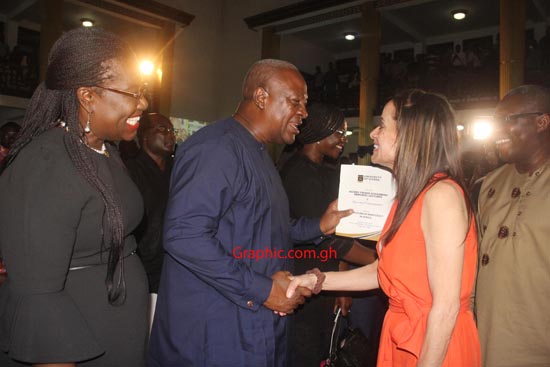
‘Democracy in Africa must be centralised on continent’s values’
The Vice-Chancellor of the University of Ghana, Professor Ebenezer Oduro Owusu, has stated that for democracy to thrive in Africa, it must be localised and centralised on the rich foundations of the continent’s values.
He named the values
Prof. Owusu stated this when he chaired the 2019 Aggrey-Frazer-Guggisberg Memorial Lectures, held at the University of Ghana last Thursday. It was on the theme: “The future of democracy in Africa.”
It was attended by people in the academia, students, representatives of civil society groups, democracy watchers and politicians, including former President John Dramani Mahama.
Examples
Prof. Owusu stressed that democracy must not be at war with African cultural values. “If we have been able to situate our democracy within our cultural values, we will be making tremendous progress as a nation and as a continent,” he said.
He cited Asian countries such as Japan and China, which he said, situated their democracies within their culture and it had worked perfectly for them and wondered why Africa could not do
He charged the political leadership of the country to think through it, “so that we do not lose the great values as Ghanaians.”
The Vice-Chancellor also talked about the need for democracy in Africa to be strengthened.
“Democracy will strive well when we take a step back to look at our traditional and cultural values where there is respect for the elderly, where you cannot insult and where you cannot steal,” he said.
Turning his attention to the theme for the lecture, Prof. Owusu pointed out the need for civil societies to be strengthened to make democracy function well and also for the fight against corruption to be strengthened.
Youth activists
Delivering the lecture for the day, on the topic, “Democracy’s keepers: The rise of the activists generation in Africa,” the President and Chief Executive Officer of KRL International in the United States of America (USA), Ms K. Riva Levinson, said youth activism in Africa was gradually becoming a powerful tool in getting citizens to the streets to demand political and economic reforms.
"They are not accepting the governing status quo that squanders their national resources. They are nationalistic and proudly African.
"They wish to be defined by future possibilities and not by past constraints. They are the future. They are all of you here in this Great Hall," she said.
Youth activism
Youth activism is youth engagement in organising
Ms Levinson cited Senegal in 2011, Burkina Faso in 2015 and the Democratic Republic of Congo (DRC) in 2018, as instances where the youth were able to rally the citizenry to demand the removal of their leaders through the ballot box.
She said in all the three instances, the youth galvanised the citizenry to ensure that those presidents, who wanted to entrench themselves as leaders were booted out of power.
Citizen broom
The Le Balai Citoyen, the French translation of ‘the Citizen's Broom’ or the ‘Civic Broom’, is a political grass-roots movement in Burkina Faso, which was part of the opposition against former President Blaise Compaoré.
The group, through civic activism, organised several protests in early 2014. For example, it hosted a joint rally with another group, the Movement of People for Progress, that filled a 35,000-capacity sports stadium to its rafters.
Ms Levinson said in Burkina Faso, just as was done in Senegal, the youth embraced their countries’ musicians and local
“The ‘Citizen’s Brooms’ music was diffused on social media and radio, clubs were created to organise “Citizen Sweepers” across the country and abroad,” she recounted.
In 2015, Blaise Compaoré was forced to resign from office and fled to Côte d'Ivoire, paving the way for the country to hold democratic elections later that year, she added.
Afro barometer
Citing the Afro barometer which gauges corruption perception across the world, Ms Levinson said from 2016 to 2018, the Afro barometer conducted 45,000 face-to-face interviews in 34 African countries, asking about democracy, political freedoms and elections.
She said the data, among others, concluded that Africans believed in democracy and that it was preferable to all other forms of governments.
Recommendations
Ms Levinson recommended that development partners needed to support the activists of civil society by investing in those organisations, empowering them with management skills, mobilisation tools and new technologies.
She asked civil society to invest in data and own it, on all parts of the democratic process, from polling of opinions on leadership, on trust in institutions to attitudes towards the future.
“Early collection of data can serve as a check against fake news on the day of the vote. And no competitive election should take place in Africa again without a parallel vote tabulation (PVT), giving a non-captive validation of election results,” she advised.
